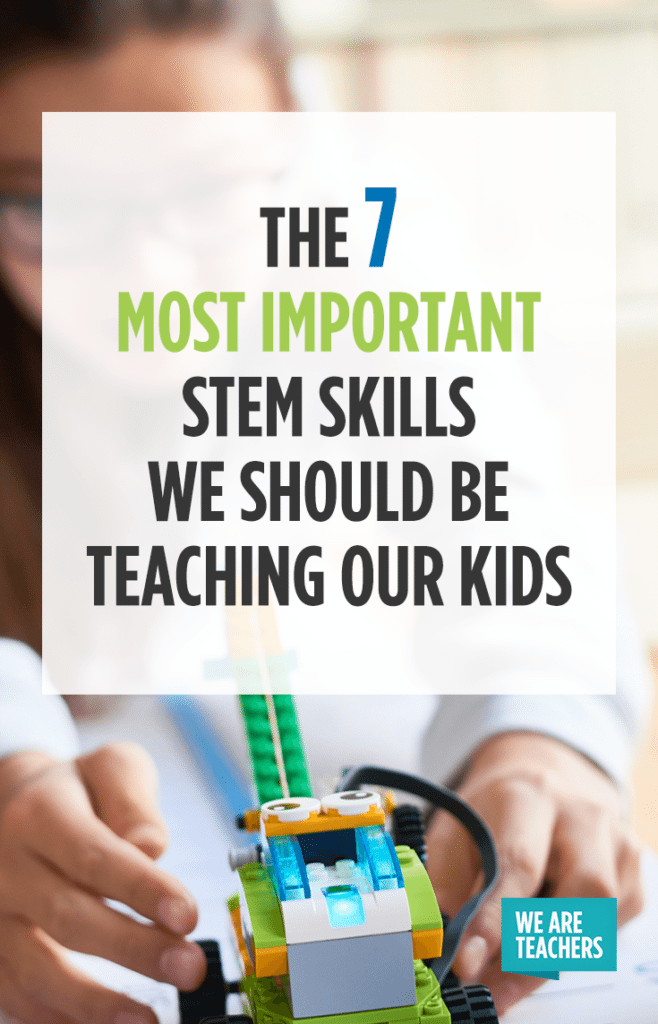Just what skills do students need today to succeed in the future? We asked 7 leaders in STEM education what they think classroom teachers should focus on to prepare kids for jobs we haven’t even conceived of yet.
Many of our interviewees cited a diverse range of skills, but we challenged them to name at least one key ability they believe will be more critical than the rest in order to succeed in future STEM fields.
We were surprised by the equal mix of “soft” and more traditional academic skills mentioned, from creativity to statistics. Read on for more of what our experts had to say:
1. Statistics
“If I were to choose one specific discipline for students to study, it would be statistics, a course that can be applied across all STEM fields. You don’t need higher levels of calculus or physics for all STEM careers, but you do need statistics. A deep understanding of statistics means understanding probability and error rates, concepts that cut across almost any type of problem you want to solve in STEM.”
—Gregg Fleisher, president, National Math and Science Initiative, Dallas, Texas
2. Problem-Solving
“What binds together the STEM movement is the notion of modern skills. Employers talk about problem-solving. Society requires problem-solving. Doing your taxes requires problem-solving. Those are the types of skills that really matter. A practicing engineer will tell you, ‘I didn’t use the calculus I learned to solve problems on paper, but the way it taught me to solve problems and to think about problems was really important.’”
—James Brown, executive director of the STEM Education Coalition in Washington, D.C., and a nuclear engineer by training
3. Creativity
“Creativity can be simple and complex at the same time. We don’t always teach to think outside of the box. You’ve got to look at a problem from a different perspective sometimes. Teachers can nurture this by asking open-ended questions. In math and science, you can show different models so students get varying ideas of how it might look to bring together one idea. Or don’t show a model at all and leave it a little open-ended so they have to come up with a solution on their own. Ask: ‘Why do you think this is?’ Reflecting and explaining what they did to solve a problem can foster creativity and teach collaboration—another important skill.”
—Jenny Nash, education specialist with LEGO Education in Boston, former middle school teacher and teacher-preparation instructor
4. Argumentation
“The act of arguing is using evidence to support a claim. In the STEM fields, this means using analytical and critical-thinking skills to look for patterns in data, trying to determine what those patterns mean, and then using that data to support a claim. This skill transfers across all disciplines. In an elementary school science class, for example, if you give students a lot of different experiences with noisemakers—everything from tuning forks to speakers to whoopee cushions—they have the experience of collecting data. And then they will be able to use that data to make the argument that sounds are caused by vibrations.”
—Eric Brunsell, associate professor of science education and director of the teacher education program at University of Wisconsin, Oshkosh
5. Intellectual Curiosity
“The days of coming into an organization and having the same role forever are over. Many people will have two-year stints and then are moved into a different role. That’s the nature of modern career paths. Beyond mastering content, individuals need to be innovators, learn from failures and keep moving on. You need to cut across disciplines and be able to ask the questions that help build connections. People need to be lifelong learners and be driven by an intellectual curiosity to try to figure things out.”
—Ted Wells, vice president and chief strategy officer at STEMconnector®, in Washington, D.C.
6. Data-Driven Decision-Making
“Students need to be able to make a decision not just based on what they think or feel, but on scientific data that supports the best solution. Everyone needs to know how to do this. It doesn’t matter whether you go on to a career in STEM or not—you need to know how to use data to make informed decisions in your life.”
—Stacy Klein-Gardner, director of Center for STEM Education for Girls at Harpeth Hall School in Nashville, Tennessee. She is a biomedical engineer and on faculty at Vanderbilt University.
7. Flexibility
“People are now required to adapt quickly to new demands and new situations. They need quantitative skills to manipulate data well. They need to be able to communicate clearly. There is a broad set of skills that, I would argue, everyone needs. Just look at the sheer number of people in manufacturing who were skilled at what they did but who now need a whole new set of skills, often late in their careers, to be viable in the job market. They need to know statistics, technology, quality control. They need to understand programming and systems to ensure the automated production technology is operating correctly. The trick for teachers is to give their students authentic problems to tackle in school, problems that require students to draw on different areas of knowledge and skill.”
—Claus von Zastrow, chief operating officer and director of research for Change the Equation in Washington, D.C.
Teachers, what are your thoughts? Do you have any focus skills that you particularly try to instill in your students? Please share in the comments!



